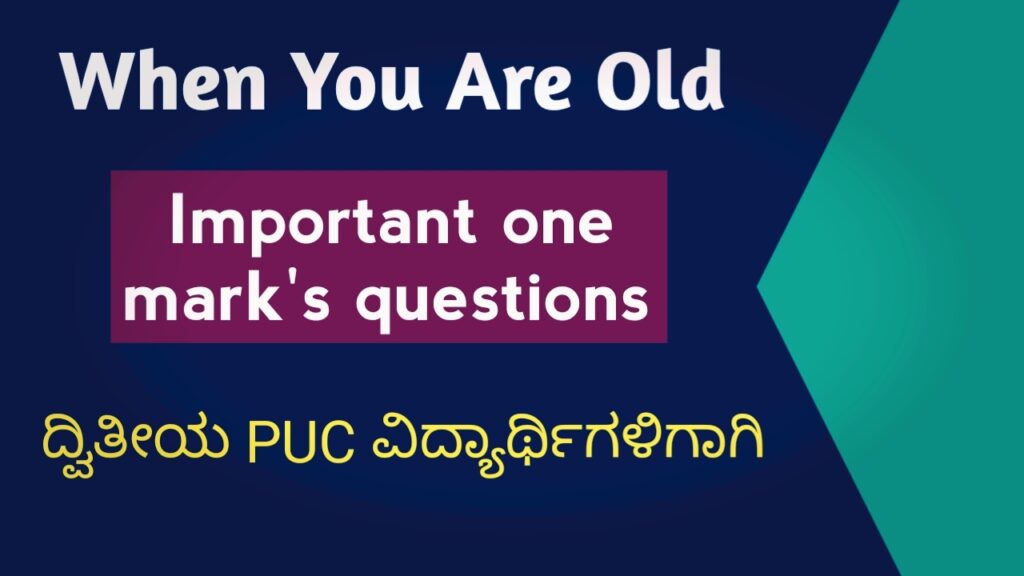
When you are Old poem one marks question and answer for class 12. Notes of the poem When you are Old. English notes for second PUC exam.
In this post we have uploaded When you are Old poem questions and answers. Important English notes for class 12. When you are Old poem mcq.
To get more video notes for class 12, visit our YouTube channel. This channel is very useful for second PUC exam.
Notes of the poem When you are Old
I. Answer the following questions in a word, a phrase or a sentence each.
1. How is the journey from youth to old age described in the poem?
Answer: Others loved his beloved for her physical beauty. The poet loved his beloved for her pilgrim soul and inner beauty.
2. What images does the poet use in the poem?
Answer: The poet uses following images in the poem: grey hair, full of sleep, nodding by the fire, deep shadows of eyes, sorrow of changing face, glowing bars etc.
3. What is the rhyme scheme of the poem?
Answer: The poem is written in iambic pentameter with the rhyme scheme ABBA CDDC EFFE which gives a steady rhythm to the poem.
4. The term “glad grace” is an example of what literary device?
Answer: The repetition of the ‘g’ sound suggests that it is an example of alliteration.
5. By having love flee to join the “crowd of stars” overhead, what is the speaker suggesting is its role in life?
Answer: Love is described as having a role of protector and guidance through life for the pilgrim soul.
6. What does the speaker want his beloved to do sitting by the fire in ‘When you are old’?
Answer: To read the book of memories and remember her past, sitting by the fire.
7. The speaker in ‘When you are old’ addresses …………
Answer: a young lady
8. When according to the speaker will the lady be ‘grey and full of sleep’?
Answer: When she is old and sitting nodding by the fire.
9. Who according to the speaker will be ‘nodding by the fire’?
Answer: An old lady with whom the speaker was in deeply love.
When you are Old poem questions and answers
10. What does the speaker want his beloved to do sitting by the fire?
Answer: To take the book of his memories and read it slowly / recall the past memories.
11. What does the speaker suggests to his beloved to dream of?
Answer: To dream of the soft look her eyes once had and the deep shadows they now have.
12. According to the speaker what did many admire the lady for?
Answer: Many admire the lady for his physical beauty.
13. In the poem ‘When you are old’ many loved the lady’s for her ……….
Answer: physical beauty.
14. Who according to the speaker loved the beloved’s pilgrim soul?
Answer: The speaker / The poet.
15. Whose pilgrim soul did the speaker love?
Answer: A young lady with whom the speaker is deeply in love.
16. What did the speaker love besides the pilgrim soul?
Answer: Love the sorrows of changing face of his beloved.
17. Who according the speaker fled and hid his face?
Answer: According to the speaker in ‘When you are old’, Love fled and hid his face.
18. Where according to the speaker did love pace upon?
Answer: According to the speaker love pace, upon the mountain overheads.
19. What according to the speaker did love hid amid a crowd of stars?
Answer: According to the speaker love hide his face amid a crowd of stars.
20. Where according to the speaker did love his face?
Answer: Hide his face amid a crowd of stars.
When you are Old poem important questions
21. The Pilgrim soul means the soul _______
Answer: The soul which is questioning for true love.
22. The speaker suggest his beloved to slowly read the book she is ………..
Answer: old
23. In ‘When You Are Old ‘, the speaker loved ______ of his beloved’s changing face of
Answer: sorrows
24. What look did the woman’s eyes have once in ‘When you are old ‘?
Answer: Soft look
25. According to the speaker, what will woman regret in her old age?
Answer: The woman will regret that she has rejected the person who truly loved her.
26. Who is the speaker / poet of ‘When You Are Old’?
Answer: William Butler Yeats (W.B. Yeats)
Watch this video for the explanation of When you are Old poem one marks question and answer for class 12.
